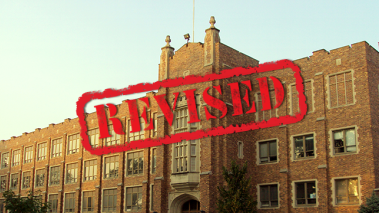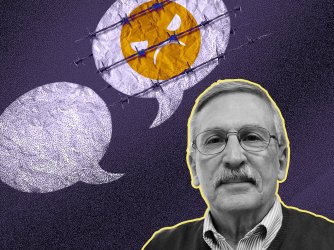Table of Contents
Speech Code of the Month: University of North Dakota

FIRE announces its Speech Code of the Month for December 2012: the University of North Dakota (UND).
UND defines "harassment" (PDF) as:
[U]nacceptable behavior, which can range from violence and bullying to more subtle behavior such as ignoring an individual at work or study. It subjects an individual or a group to unwelcome attention, intimidation, humiliation, ridicule, offense or loss of privacy. It is unwanted by the recipient and continues after an objection is made.
The policy further provides that:
This definition includes sexual and racial harassment, and bullying as well as any other form of personal harassment arising from disability, sexual orientation, gender identity, socioeconomic status, age, religion etc. It can be a single explicit incident causing distress or repeated unacceptable behavior affecting the dignity of an individual that appears or feels offensive, demeaning, intimidating or hostile....
This policy goes far beyond prohibiting actual harassment and prohibits a great deal of speech that UND, a public university, is both legally and morally bound to protect. Moreover, it is so vague that students have no way of knowing whether their speech or expression might inadvertently run afoul of the policy.
The easiest way to see how this policy violates the First Amendment is to compare it to the actual definition of peer harassment in the educational setting established by the U.S. Supreme Court in Davis v. Monroe County Board of Education, 526 U.S. 629 (1999). In Davis, the Court defined actionable harassment as conduct that is "so severe, pervasive, and objectively offensive, and that so undermines and detracts from the victims' educational experience, that the victim-students are effectively denied equal access to an institution's resources and opportunities."
Far from requiring that harassment be "severe" conduct, UND's policy defines it broadly to include any conduct that subjects an individual or group to "offense" or "ridicule." This directly contradicts not only the Supreme Court's holding in Davis, but also decades of court decisions affirming that "If there is a bedrock principle underlying the First Amendment, it is that the government may not prohibit the expression of an idea simply because society finds the idea itself offensive or disagreeable." Texas v. Johnson, 491 U.S. 397, 414 (1989). See also Saxe v. State College Area School District, 240 F.3d 200, 206 (3d Cir. 2001) (holding that there is "no question that the free speech clause protects a wide variety of speech that listeners may consider deeply offensive...."); Doe v. Michigan, 721 F. Supp. 852 (E.D. Mich. 1989) ("Nor could the University proscribe speech simply because it was found to be offensive, even gravely so, by large numbers of people").
Not only does the policy prohibit speech simply because it is offensive, it contains no objective, "reasonable person" standard. Rather, a violation can occur if the behavior "feels offensive" or "demeaning" to the person in question, however sensitive he or she may be. As a result, UND students enjoy their free speech rights only at the mercy of the most sensitive members of the university community—a problem the Davis court explicitly addressed when it required that harassment be not only severe and pervasive, but also "objectively offensive." Indeed, courts have repeatedly struck down speech codes that condition speech on subjective listener reaction. In Saxe, the U.S. Court of Appeals for the Third Circuit struck down a public high school's anti-harassment policy on First Amendment grounds because it conditioned the permissibility of speech on subjective listener reaction. The court found the policy unconstitutional because it did not "require any threshold showing of severity or pervasiveness," and thus "it could conceivably be applied to cover any speech about some enumerated personal characteristics the content of which offends someone." Saxe, 240 F.3d at 217. The court emphasized that "it is certainly not enough that the speech is merely offensive to some listener." Id. See also Bair v. Shippensburg University, 280 F. Supp. 2d 357 (M.D. Pa. 2003) ("regulations that prohibit speech on the basis of listener reaction alone are unconstitutional both in the public high school and university settings").
In addition to the fact that it explicitly prohibits speech protected by the First Amendment, UND's policy is so vague that students will have to guess at how to comply. The Supreme Court has held that laws must "give a person of ordinary intelligence a reasonable opportunity to know what is prohibited, so that he may act accordingly," or else they are unconstitutionally vague. Grayned v. City of Rockford, 408 U.S. 104, 108-09 (1972). This policy—which prohibits things like "bullying" and "subtle," "unacceptable behavior" without defining what those terms mean—does not meet this standard.
For these reasons, UND's harassment policy is our December 2012 Speech Code of the Month. If you believe that your college's or university's policy should be a Speech Code of the Month, please email speechcodes@thefire.org with a link to the policy and a brief description of why you think attention should be drawn to this code. If you are a current college student or faculty member interested in free speech, consider joining FIRE's Campus Freedom Network, an organization of college faculty members and students dedicated to advancing individual liberties on their campuses.
Recent Articles
FIRE’s award-winning Newsdesk covers the free speech news you need to stay informed.

Should the First Amendment protect hate speech?
In America, hate speech is generally protected by the First Amendment. But should it be? Today's guest is out with a new book, "." W. Wat Hopkins is emeritus professor of communication at Virginia Tech, where he taught communication law and...

Here’s what students need to know about protesting on campus right now

Kansas takes a stand for intellectual freedom
